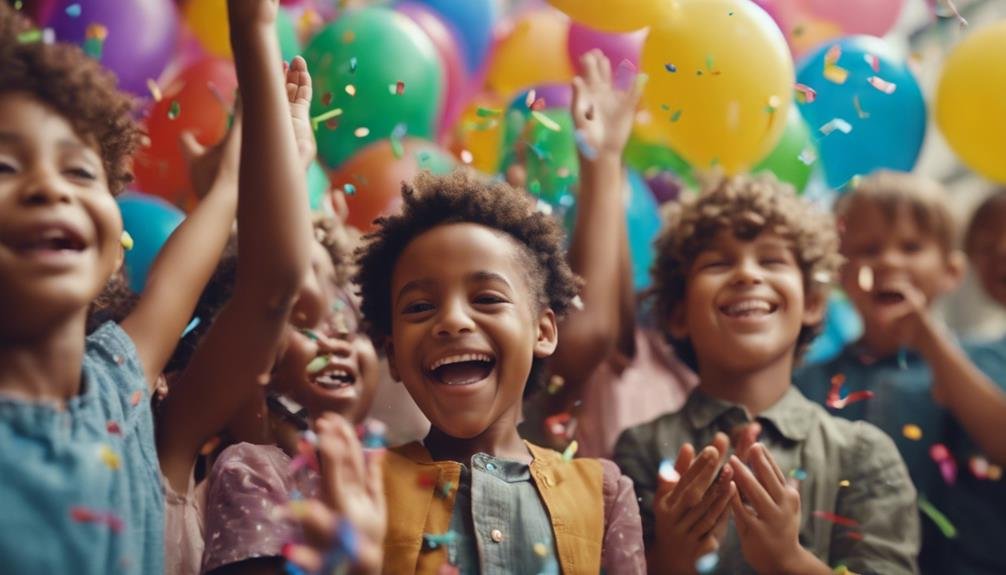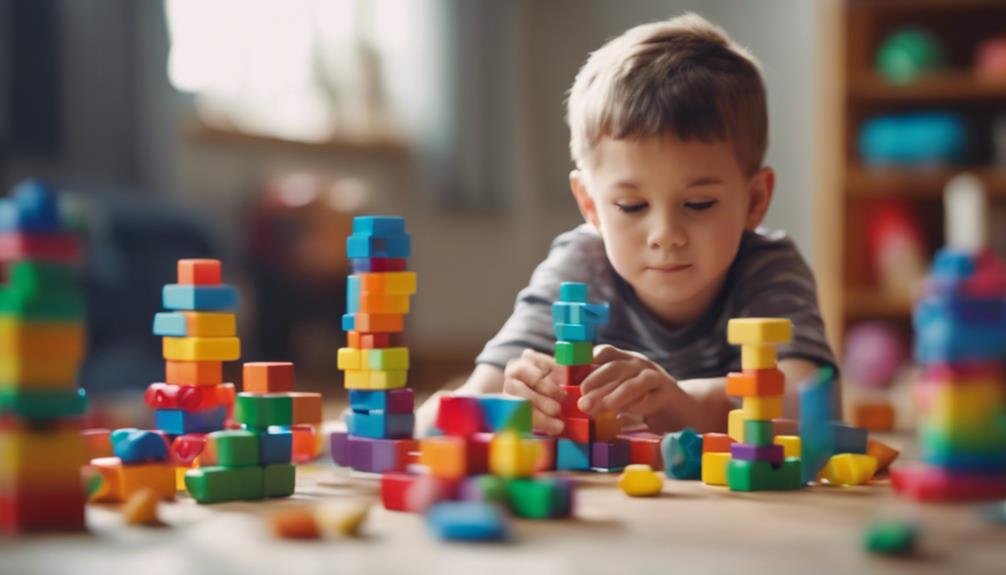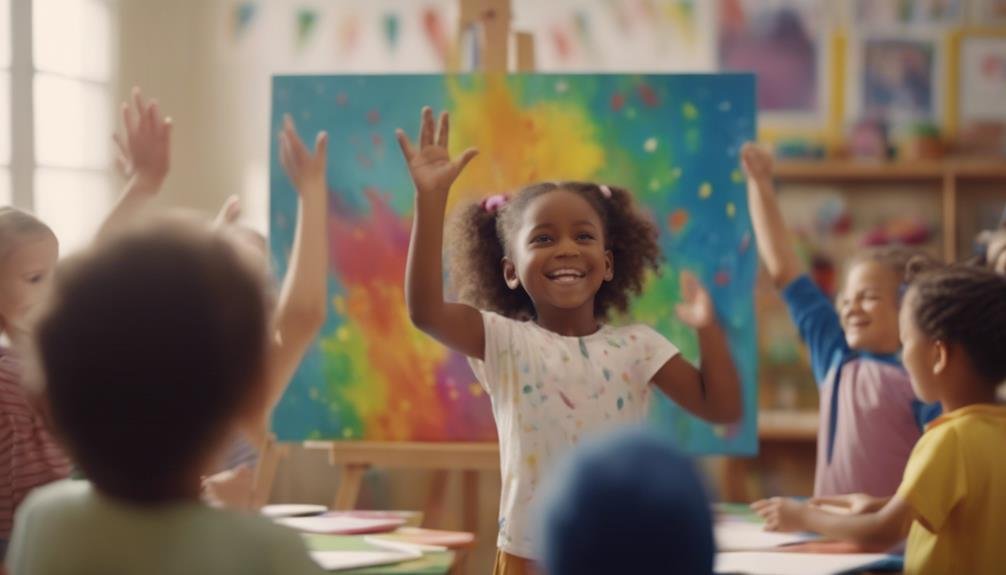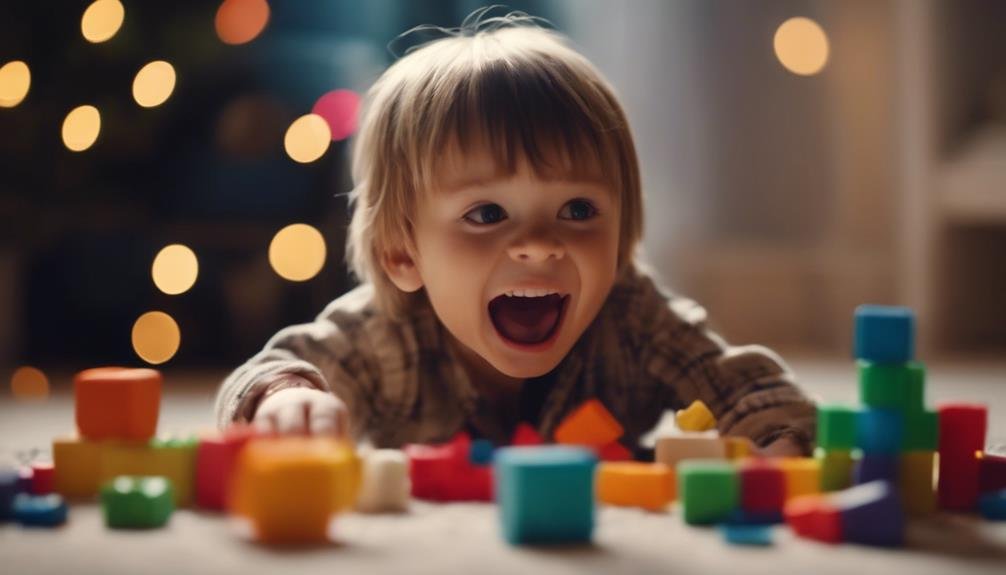"Cherishing Little Steps - A Haven for Baby and Family Journeys"
Celebrating Milestones in Early Childhood: Recognizing and Encouraging Progress
Did you know that celebrating milestones in early childhood goes beyond just acknowledging achievements? It plays a vital role in shaping a child's self-esteem and motivation to learn. As you witness the small victories and progress your child makes, you might be surprised by the significant impact these celebrations have on their overall development.
Stay tuned to discover practical ways to recognize and encourage the milestones in your child's early years that can set a strong foundation for their future growth and success.
Key Takeaways
- Celebrate social, cognitive, language, and physical achievements in early childhood.
- Support creativity, independence, and problem-solving skills through play.
- Foster strong relationships, effective communication, empathy, and teamwork.
- Provide a safe environment for physical development, boosting confidence through exploration and play.
The Importance of Milestone Recognition

Recognizing milestones in a child's early development is significant for understanding their progress and ensuring appropriate support along the way. Parental involvement plays a vital role in this process. As a parent, your active participation in celebrating your child's milestones helps in creating a positive and nurturing environment for their growth. These milestone celebrations aren't just about the achievement itself but also about acknowledging the effort and progress made by your little one.
Community support further enhances the development recognition journey. Being part of a supportive community allows for shared experiences, advice, and encouragement. It can be reassuring to know that others are there to cheer on your child's milestones alongside you. By engaging with your community, you not only gain valuable insights but also foster a sense of belonging and shared accomplishment.
Early Social Skills Development
As your child progresses in their early development journey, fostering social skills becomes key to their growth and interactions with others. Developing strong communication skills and positive social interactions early on can have a major impact on your child's future relationships and overall well-being.
Here are some essential aspects to think about as you nurture your child's social skills:
- Encourage Communication Skills: Engage in conversations with your child, actively listen to what they've to say, and encourage them to express their thoughts and feelings. This helps them build confidence in communicating with others.
- Support Social Interactions: Arrange playdates or group activities where your child can interact with peers. Teaching them how to take turns, share, and cooperate with others lays a solid foundation for healthy social relationships.
- Model Positive Social Behavior: Children learn by observing, so be a positive role model. Demonstrate kindness, empathy, and good manners in your interactions with others to show them how to navigate social situations effectively.
Cognitive Milestones to Celebrate

To celebrate cognitive milestones in early childhood, embrace the wonder of your child's growing mind and the progress they're making every day. At this stage, your child is developing memory retention and information processing skills, laying the foundation for future learning. It's incredible to witness their cognitive development as they start to grasp more complex concepts and enhance their problem-solving skills.
Encourage your child's cognitive milestones by providing stimulating activities that challenge their mind. Puzzles, memory games, and storytelling can all help strengthen their cognitive abilities. Celebrate their achievements, whether big or small, to boost their confidence and motivation to keep exploring and learning.
As a parent, you play an important role in nurturing your child's cognitive growth. Engage in conversations, ask open-ended questions, and encourage curiosity to support their cognitive development. Remember, every child progresses at their own pace, so celebrate the unique milestones your child reaches on their cognitive journey.
Promoting Language Development
Celebrate your child's blossoming language skills by creating a rich environment that nurtures their ability to communicate effectively and express themselves with confidence. Encouraging language development is important for your child's overall growth and future success.
Here are some tips to help you promote your child's language skills:
- Vocabulary Expansion: Engage your child in conversations and introduce new words daily. Encourage them to ask questions and explore the meanings of words they encounter.
- Reading Readiness: Make reading a daily habit. Choose age-appropriate books and read together. Point out pictures, ask questions, and encourage your child to retell the story in their own words.
- Speech Therapy and Communication Skills: If you notice any difficulties in your child's speech or language development, consider seeking help from a speech therapist. They can provide targeted exercises and strategies to enhance your child's communication skills.
Encouraging Physical Achievements

Nurturing your child's physical achievements begins with creating a safe and stimulating environment that encourages exploration and movement. By providing opportunities for your little one to practice both their gross motor skills, like crawling, walking, and jumping, and fine motor skills, such as picking up small objects and scribbling with crayons, you're supporting their physical development and motor milestones. Simple activities like playing with building blocks, crawling through tunnels, or drawing with chalk can make a significant impact on your child's coordination and strength.
As your child progresses, celebrate their achievements, no matter how small they may seem. Encouragement and praise play an important role in boosting their confidence and motivation to continue exploring their physical capabilities. Remember that every child develops at their own pace, so be patient and provide a supportive environment for them to thrive. Your involvement and enthusiasm in their physical achievements won't only foster a healthy relationship but also set the stage for a lifelong love of movement and activity.
Emotional Milestones and Support
Creating a nurturing environment that supports your child's emotional milestones is important for their overall well-being and development. It's essential to provide them with the tools and support they need to navigate their emotions effectively. Here are some ways you can help your child build emotional resilience and develop healthy coping strategies:
- Emotional Resilience: Encourage your child to express their feelings openly and validate their emotions. By fostering a safe space for them to communicate, you help strengthen their emotional resilience.
- Parental Support: Be a source of comfort and guidance for your child. Show them love and understanding, and be there to listen when they need to talk. Your support plays a significant role in helping them regulate their emotions.
- Self-Regulation: Teach your child how to manage their emotions in a healthy way. Help them identify triggers and explore coping mechanisms such as deep breathing or taking a break when feeling overwhelmed. By empowering them with self-regulation skills, you equip them for life's emotional challenges.
Celebrating Creative Expressions

Encouraging and embracing creative expressions in your child's early years can profoundly enrich their developmental journey. By nurturing their artistic achievements, musical expressions, imaginative creations, and dramatic performances, you are providing them with a platform to explore their thoughts, emotions, and capabilities. Celebrating these milestones not only boosts their self-esteem but also encourages them to think outside the box and express themselves freely.
| Artistic Achievements | Musical Expressions | Imaginative Creations |
|---|---|---|
| Painting and drawing with various materials | Singing, playing instruments, and dancing | Building stories, inventing characters |
| Exploring colors, shapes, and textures | Experimenting with rhythm and melody | Creating fantastical worlds and scenarios |
| Encouraging creativity and originality | Developing a sense of rhythm and harmony | Engaging in pretend play and role-playing |
Dedicating time to celebrate these creative expressions will not only foster a love for the arts but also aid in their overall cognitive and emotional development. So, continue to support and applaud your child's creative endeavors, as each brushstroke, musical note, story, or performance is a step towards their growth and self-discovery.
Encouraging Independence and Autonomy
Fostering your child's independence and autonomy begins with providing opportunities for them to make choices and decisions on their own. Encouraging self-help skills empowers them to take charge of their actions and build confidence in their abilities.
Here are some tips to support your child's journey towards independence:
- Encourage Decision Making: Offer your child choices within appropriate limits to help them practice decision-making skills. For example, let them choose between two outfits to wear or decide which book to read before bed.
- Teach Self-Help Skills: Guide your child in learning basic self-help skills like dressing themselves, brushing their teeth, or preparing simple snacks. These tasks not only foster independence but also boost their self-esteem.
- Celebrate Small Achievements: Acknowledge and celebrate even the smallest milestones your child achieves in their quest for autonomy. Encouragement and positive reinforcement go a long way in nurturing their independence.
Supporting Milestones in Play

To further nurture your child's growth and development, consider how play can support important milestones in their early years. Playtime isn't just about fun; it's a vital tool for your child to explore their imagination and foster creativity. Through play, children learn to express themselves, develop problem-solving skills, and build social connections.
Encouraging your child to engage in imaginative play, such as pretending to be a chef or a superhero, helps them explore different scenarios and expand their creativity. Providing them with open-ended toys like building blocks or art supplies allows for endless possibilities, sparking their imagination.
Celebrating Progress in Problem-Solving
Celebrate each small victory in your child's problem-solving journey as they navigate through different challenges and puzzles. Acknowledge and encourage their problem-solving growth and developmental achievements. Remember, recognizing and supporting their problem-solving skills is crucial.
Here are three ways you can celebrate and support your child's problem-solving skills:
- Encouragement: Offer words of encouragement when your child faces a problem. Let them know you believe in their ability to find a solution and that acknowledging mistakes along the way is important.
- Provide Challenges: Offer age-appropriate puzzles or games that require problem-solving skills. This can help them practice critical thinking and logical reasoning in a fun and engaging way.
- Celebrate Effort: Instead of just focusing on the outcome, celebrate the effort your child puts into solving a problem. Acknowledge their hard work and persistence, regardless of the result. This can boost their confidence and motivation to keep trying. Remember, every step forward is a reason to celebrate!
Nurturing Milestones in Relationships

As your child navigates through various challenges and puzzles, fostering strong problem-solving skills, it's also important to nurture milestones in relationships, fostering healthy connections with others. Building bonds with family, friends, and peers is a critical aspect of your child's social and emotional development. Encouraging positive social interactions helps them learn how to communicate effectively, share, and empathize with others.
Taking the time to engage in activities that promote teamwork and cooperation can greatly benefit your child's ability to build relationships. Simple tasks like playing group games, working on projects together, or participating in community events can foster a sense of camaraderie and belonging. These experiences help your child understand the value of collaboration and develop essential social skills that will serve them well throughout their lives.
Frequently Asked Questions
How Can I Support My Child's Milestones While Balancing Work and Other Responsibilities?
You can balance work and support your child's milestones by practicing good time management and leaning on your support systems. Stay involved in their development through open communication strategies to guarantee progress and connection.
Are There Any Specific Milestones That Children in Different Cultures or Environments May Reach at Different Times?
You might notice that cultural differences and environmental influences can affect when children reach certain milestones. It's normal for kids from diverse backgrounds to have varying developmental norms and achievement variations. Trust your child's unique journey.
What Are Some Ways to Celebrate Milestones That Don't Involve Material Rewards?
You can honor achievements with creative celebrations like picnics in the park, movie nights, or nature walks. Homemade milestones, like a special song or scrapbook, enrich family experiences and memories without relying on material rewards.
How Can I Handle It if My Child Is Not Reaching Milestones at the Same Rate as Their Peers?
If your child isn't hitting milestones like others, it's okay. Provide parental support, avoid constant peer comparison. Consider early intervention if needed. Have patience, every child grows differently. Your understanding and love matter most.
Are There Any Red Flags to Look Out for That May Indicate a Delay in Milestone Development?
If you notice your child isn't hitting milestones, remember that early intervention is key. Progress monitoring can help address developmental delays. Trust your parental instincts and seek support if concerns arise. You're not alone.
Conclusion
As you celebrate each milestone in your child's early years, you're nurturing their growth and development like a gardener tending to a blooming garden. Recognize their progress in social skills, cognitive abilities, language development, physical achievements, independence, play, problem-solving, and relationships.
Encourage them every step of the way, guiding them towards a bright future filled with endless possibilities. Your support and encouragement are the keys to unleashing their full potential. Keep celebrating those milestones!


